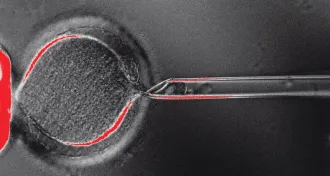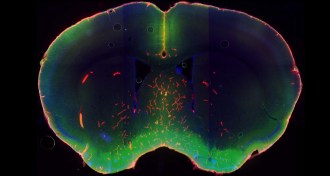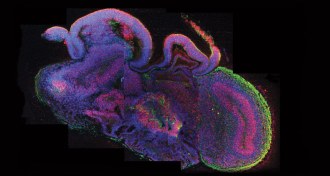Feature
-
 Climate
ClimateYear in Review: Carbon dioxide levels pass milestone
Although scientists are confident about humankind’s role in climate change, they still have a lot to learn about the magnitude and timing of future climate shifts.
By Erin Wayman -
 Genetics
GeneticsYear in Review: Caffeine triggers cloning advance
To successfully clone human cells, eggs must be dunked in the stimulant.
By Meghan Rosen -
 Humans
HumansYear in Review: Language learning starts before birth
Babies seem familiar with vowels and words heard while in the womb.
-
 Science & Society
Science & SocietyYear in Review: High court rules against gene patents
The justices’ decision opens the way for choices in DNA testing.
-
 Health & Medicine
Health & MedicineYear in Review: Sleep clears the cluttered brain
Some forms of brain washing are good, like the thorough hosing the brain gets during sleep.
-
 Life
LifeYear in Review: A double dose of virus scares
Outbreaks of two deadly viruses captured the world’s attention in 2013, but neither turned into the global pandemic expected to strike one of these years.
-
 Humans
HumansYear in Review: New discoveries reshape debate over human ancestry
Human evolution appears poised for a scientific makeover as the relationships among early hominids are disputed.
By Bruce Bower -
 Cosmology
CosmologyYear in Review: Planck refines cosmic history
The satellite data hint at a slower expansion rate for universe.
By Andrew Grant -
 Life
LifeYear in Review: Bioengineers make headway on human body parts
New techniques produce mimics of brain, liver, heart, kidney, retina.
By Meghan Rosen -
 Life
LifeYear in Review: Your body is mostly microbes
Microbiome results argue for new view of animals as superorganisms.
-
 Science & Society
Science & SocietyTop 25 stories of 2013, from microbes to meteorites
This year, careful readers may have noticed a steady accumulation of revelations about the bacterial communities that call the human body home.
By Matt Crenson -
 Science & Society
Science & SocietyHeal thy neighbor
As antidepressants and other drugs gradually replace psychotherapy in the United States, new forms of the talking cure are growing in popularity in developing countries ravaged by civil war and poverty.
By Bruce Bower